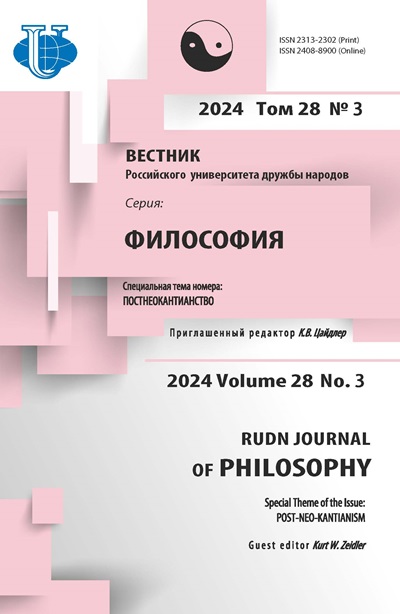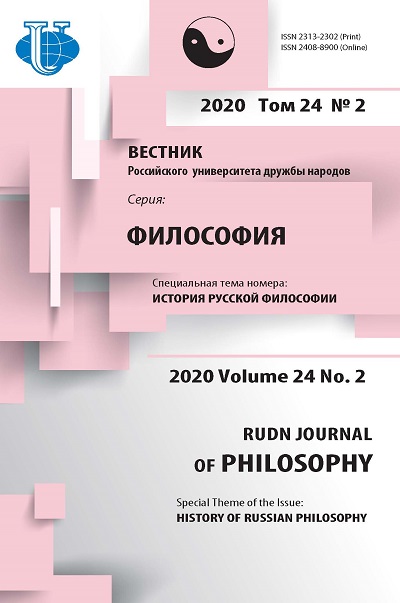Sobornost’ and Humanism: Cultural-Philosophical Analysis of V. Ivanov Essay “Legion and Sobornost’ ”
- Authors: Corrado-Kazanski F.1
-
Affiliations:
- Bordeaux-Montaigne University
- Issue: Vol 24, No 2 (2020): HISTORY OF RUSSIAN PHILOSOPHY
- Pages: 187-200
- Section: HISTORY OF RUSSIAN PHILOSOPHY
- URL: https://journals.rudn.ru/philosophy/article/view/23675
- DOI: https://doi.org/10.22363/2313-2302-2020-24-2-187-200
Cite item
Full Text
Abstract
This paper addresses the philosophical and cultural significance of the concept of «sobornost’» both in the cultural context of Silver Age and in the historical context of World War I. The analysis of Ivanov’s thought is based on a philological approach of his essay «Legion and Sobornost’» (1916), in which the author explains his understanding of such terms as organisation, cooperation, collectivism in order to clarify his own idea of collegiality and the ontological opposition of the title. The opposition between legion and collegiality duplicates the confrontation between Germany and Russia. Vyach. Ivanov first conducts a cultural analysis of such a confrontation, and criticizes Nietzscheanism in German culture at the turn of the 19th and 20th centuries. He proves the false understanding of the organization in modern German culture. In his opinion, the main values of freedom and personhood are the measure of lies or truth. In the last chapter of his essay, Vyach. Ivanov gives his own definition of collegiality, not referring to Russian thinkers, but quoting the two cities of St. Augustine’s thought. The author of the article shows that the culturological perspective is overcome by the Christian anthropological and mystical perspective, which proclaims humanism and Christocentrism. Therefore, accordind to Vyach. Ivanov, the word “sobornost” is a “universal word”, which mentions that the true social union has Christ as its center. In this sense, the concept of collegiality signifies the same mystical reality that the City of God of St. Augustine.
About the authors
Florance Corrado-Kazanski
Bordeaux-Montaigne University
Author for correspondence.
Email: florencecorrado@gmail.com
Doctor of Philology, associate Professor
EA 4395 CLARE, FranceReferences
- Poltavceva N. Vojna kak model' konflikta v sbornike statej Vjacheslava Ivanova «Rodnoe i vselenskoe» (k jubileju pervoj mirovoj vojny). URL: http://synopsis.kubg.edu.ua/ index.php/synopsis/article/view/107 (In Russian).
- Obatnin G. Ivanov-mistik. Moscow: NLO, 2000. P. 139. (In Russian).
- Ivanov Vjach. Legion i sobornost'. URL: http://rvb.ru/ivanov/1_critical/1_brussels/ vol3/01text/02papers/3_140.htm (In Russian).
- Obatnin G. Ivanov-mistik. Moscow: NLO, 2000. P. 128. (In Russian).
- St. Augustine. The City of God. XIV, 28, http://az.lib.ru/a/awgustin_a/ text_0427_de_civitate_dei-1.shtml (in Russian).
- Dudek A. Idei bl. Avgustina v pojeticheskom vosprijatii Vjach. Ivanova. Europa orientalis. Studi i ricerche sui Paesi e le culture dell’Est Europeo. 2002; XXI (1):364. (In Russian).
- Teissier H. La Cité de Dieu d’Augustin et de quelques autres. Etudes. 2001. Vol. 395. P. 364. URL: http://www.cairn.info/revue-etudes-2001-10-page-353.htm (In French).
- St. Augustine. The City of God. I, 35 http://az.lib.ru/a/awgustin_a/text_0427_ de_civitate_dei-1.shtml (In Russian).
- Esaulov IA. Russkaja klassika. Novoe ponimanie, «Rodnoe kak vselenskoe v nacional'nom obraze mira: otechestvennaja slovesnost' i «russkaja ideja». Ch. 12. St. Petersburg: Aletejja, 2012. P. 313. URL: http://esaulov.net/portfolio/russkaja-klassika-novoe-ponimanie/ (In Russian).
- Teilhard de Chardin P. Notes sur le Christ-Universel. In: P. Teilhard de Chardin, Science et Christ. Paris: Seuil, 1999. P. 41. (In French).
- Teilhard de Chardin P. Métaphysique de l’Un et du Multiple. In: P. Teilhard de Chardin. Science et Christ. Paris: Seuil, 1999. P. 43. (In French).
















